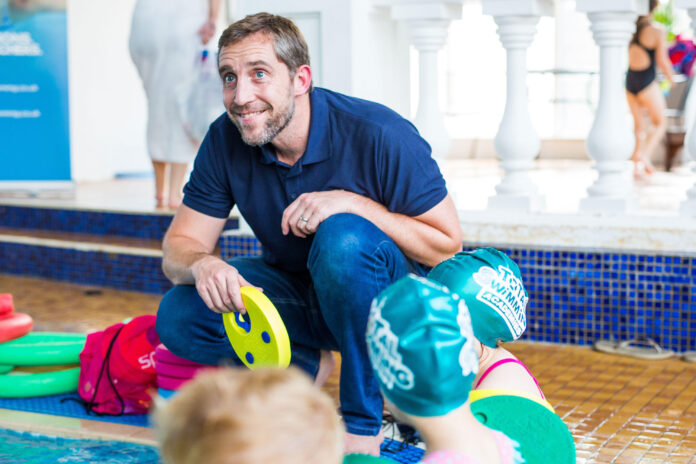GB Olympic medallists Becky Adlington, Steve Parry and Beth Tweddle have launched a national campaign, including an investment of £3m, to drive forward the recruitment of children’s swimming and gymnastic teachers.
The Olympians have warned that there is a staffing crisis, in swimming in particular. There was a shortage of trained swimming teachers pre-Covid but the pandemic exacerbated the issue due to the closure of pools across the UK. The result is hundreds of thousands of children are now missing out on lessons due to the pandemic.
Sporting House — the Bury-based company founded by Steve, which includes swim!, Total Swimming Academies, Beth Tweddle Gymnastics and Becky Adlington’s SwimStars — is investing £3m to address the shortage of trained teachers, with a view to recruit and train 100 swimming teachers and 40 gymnastics coaches by the end of the year. Longer term, they want to add 4,000 by 2030.
The campaign is designed to attract qualified coaches back to the industry as well as training new staff. Sporting House will pay the £1,000 training costs for each teacher/coach and stresses that would-be applicants don’t need any previous experience or qualifications.
Steve says, “We fundamentally believe we should hire people on attitude and then train for skill. It’s all about the relationship between the teacher and the youngster – sports teachers can be highly influential to a kid’s life. If you’re passionate about making a difference, and believe kids should have good opportunities and enjoy experiences, this is a role for you.”
He emphasises how teachers will earn an average £20,000 per year, making the roles more attractive than low-paid entry-level jobs in other sectors, and there will be career pathways for them to follow.
“We are making huge investments to pay people good salaries and deliver quality lessons,” he adds, “I hope it makes the rest of the industry think about it too.”
Becky and Steve have expressed their concerns that the industry shortage is resulting in an increasing number of children leaving primary school without knowing basic swimming survival skills.
During the pandemic, schools without their own pool couldn’t provide lessons and swim schools couldn’t operate, with staff forced to leave and find alternative employment – many then opting not to return due to worries about the availability of work and reduced income.
The easing of lockdown restrictions led to a surge in demand for lessons that hasn’t been met due to the shortage of qualified teachers, which, in turn, has created long waiting lists.
With school swimming also in decline, a huge recruitment drive is needed to fill the teaching gap.
“You have to describe the current situation as a crisis,” Becky says, “There’s always been a shortage of swimming teachers but the problem has escalated because of Covid. Swimming, together with water safety, is such an important life-skill and sadly many, many children still drown each year. It genuinely helps save people’s lives, so you have to see it as a life skill rather than just a sport. If children can’t access lessons because there aren’t enough teachers, it’s a huge worry.”
Swim England, the national governing body in England, revealed earlier this year that a nationwide shortage of 8,000 swimming teachers could mean as many as 600,000 children missing out on lessons.
And one million children could leave primary school in the next five years unable to swim the minimum standard under the national curriculum, with warnings of a “lost generation” of swimmers unless action is taken to halt the decline.
Prior to the pandemic, around one in four children could not swim the statutory 25 metres when they left primary school and it is feared that could rise to three in five children by the 2025-26 academic year.
“It’s dire,” Steve says, “I fundamentally believe all children should be able to swim. So does our education system, given it’s a statutory requirement at Key Stage 2, but we are failing to achieve it, drastically. We want to be part of the solution by providing more swimming spaces, recruiting more good quality teachers and offering more lessons.”
The recruitment campaign is also backed by World Champion gymnast and fellow Olympic medallist Beth Tweddle, with a shortage of coaches also a problem in her sport.
“There’s always been a huge demand for gymnastics,” she says, “but Covid had a huge impact and the absence of courses led to a backlog of people who were ready to take exams but couldn’t. Many teachers were forced to find other work because they wanted job security and it was uncertain when sports were going to reopen. Now we’re trying to fix that backlog by bringing in new people and offering them training.”
Sporting House also ran a ‘Save Our Swimming Pools’ campaign in early 2020, calling on local authorities to save public swimming pools from closure. A Swim England report suggested 2,000 swimming pools in England could be permanently closed by 2020.
Anyone who’s interested in applying for a position as a swim/gymnastics coach can apply here.







